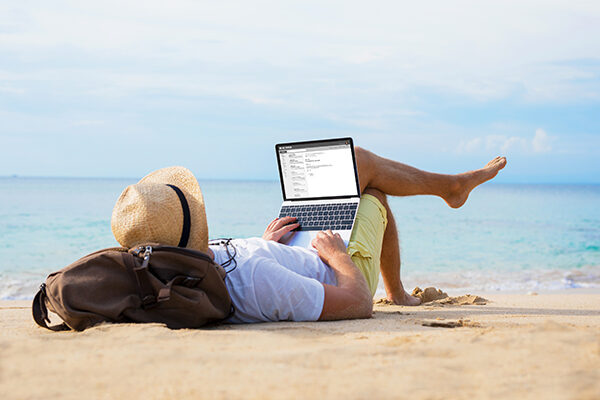Whether it’s a weekend away or a longer beach holiday, taking time off is something all of us look forward to during our working lives.
UK employees are entitled to 28 days of paid annual leave and seem to be using most of it, even at a time of political uncertainty and economic turbulence. On the other hand, the number of days freelancers take off is incredibly varied, ranging from more than 40 days to no days at all, new research by The Association of Independent Professionals and the Self-Employed (IPSE) has revealed.
The report, titled Taking Time off as a Freelancer, surveyed nearly 1,000 freelancers to find out whether they are planning – and taking – time off work. On average, freelancers take 24 days of holiday a year – four less than what employees are entitled to.
The exact number of days that freelancers take off, however, varies considerably. A third (34%) take 25 days off or more, while one in seven (13%) take 40 days off or more. At the bottom end of the scale, one in 10 take no days off at all.
The latter is perhaps concerning, considering that taking time off has a substantial positive impact on mental wellbeing, with an overwhelming majority (92%) reporting at least some positive effect.
More than two in five freelancers report feeling less stressed and anxious as a result of taking time off.
A working case for more time off
For many freelancers, time off improves work-life balance (59%) and relationships with family and loved ones (44%). Taking a break also improves the mental health and wellbeing of freelancers, with more than two in five (44%) reporting feeling less stressed and anxious as a result of taking time off. In fact, the research revealed a strong correlation between taking more time off and reporting lower levels of job-related stress.
The report also showed that almost two thirds (63%) of freelancers believe taking holiday improves their work performance in some way. When asked what advantages came with taking more time off, 63 per cent said it improved productivity, energy, creativity and confidence in their work.
Interestingly, men are more likely to report time off as having a positive impact on their personal wellbeing. They said it brought benefits such as a better work-life balance and improved relationships with their loved ones.
Women, on the other hand, are more likely to report that taking time off has a positive effect on their professional attitude and reported benefits such as feeling more productive and inspired.

Working while away
Even though freelancers reported feeling more productive after taking time off, many still work while they are away. In fact, only one in five (22%) do not work when they are on holiday.
The majority of freelancers (58%) reply to work-related emails on their holiday and a third (37%) also respond to work-related calls. And the work isn’t limited to communication. Many work on projects remotely (28%) and even find or take on new projects (20%) while on holiday.
Beyond client work, a fifth of freelancers undertake business administration activities while they are on holiday. This includes taking care of their accounting and bookkeeping (22%),and chasing late payments from clients (21%).
The ability to take time off
Generally, though, freelancers feel they are able to take time off for personal commitments such as attending a funeral, going on holiday, caring for a family member or a loved one, or attending a wedding.
However, a quarter of freelancers feel unable to take time off when feeling sick or unwell. This, the report suggests, might be associated with the fact that they are not entitled to sick pay or struggle to find a substitute for their work. A quarter of respondents even said they had missed or cancelled a medical appointment because of their self-employed work.
A quarter of freelancers also feel unable to take time off for jury service, other public duties or to study. And a fifth admitted they missed a formal or informal training course for work. Others said they had to miss personal commitments like holidays, as well as family occasions such as birthdays and anniversaries, because of their self-employed work.
Chloé Jepps, head of research at IPSE, said: “Freelancers must be encouraged to take more time off both for their businesses’ sake, and for the sake of their mental health and personal lives. Our research clearly shows that taking more leave helps freelancers combat stress and anxiety and build up their personal relationships.
“This is why our report is calling on government to improve access to training for the self-employed. It is also calling on industry to offer more flexible insurance solutions to cover for sick days and jury cover and that the self-employed are generally better catered for when taking time off.”






